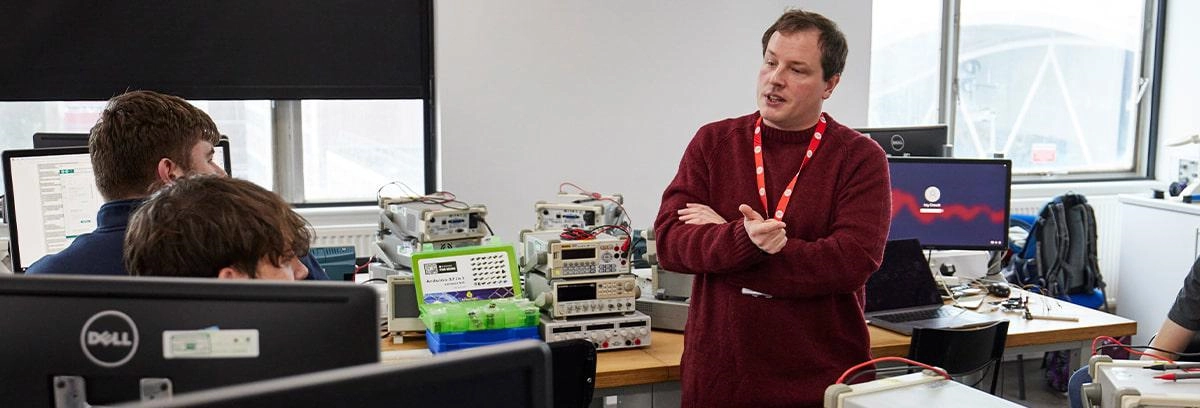FdEngElectronic Engineering
Register your interest
- 2 years full-time
- 4 years part-time
Why study an Electronic Engineering foundation degree at Solent University
With a strong focus on electronic design, this modern course allows you to progress in your electronic engineering career.
- 0thuniversity in the UK for low carbon emissions (THE 2023)
- 0thin the top 20 best student cities (StudentCrowd, 2023)
- £0invested in our campus estate and facilities
- Access to a range of high-end facilities including 3D printers and laser cutters, PSpice/NI MultiSim software and microcomputer development systems, digital multi-meter signal generators, FLIR cameras and digital signal processing boards.
- Taught by passionate specialists with industry experience and research interests in digital signal processing, micro-controller and embedded programming, automation, and various electronic communication and simulation methods.
- Solent is a pioneer in environment and engineering research – you will learn direct from leading experts in their field.
- Strong focus on hands-on exploration. This degree incorporates practical challenges, workshops and exercises, so you can put theory into practice straight away.
- Strong industry connections, providing opportunities for real-world projects
- You’ll be assigned a personal tutor who can assist you with pastoral support to help you make the most of your learning.
Course overview
The electrical engineering industry has a wide-ranging impact on sectors such as manufacturing, automotive, aerospace, and robotics. Pursuing a career in mechanical engineering allows individuals to be at the forefront of innovation, designing and developing the systems and machines that shape our world.
With a focus on practical training and skills development, Solent will prepare you to be a readily employable graduate across a range of diverse technical roles.
You'll develop your abilities in applying mathematical and scientific principles to analyse and solve mechanical engineering problems, and be intoduced to a range of mechanical systems, components, and processes and their applications.
This course has been developed in collaboration with the South Coast Institute of Technology, providing partnerships with well known employers including The Royal Navy, Portsmouth International Port and Maritime UK Solent, who contribute to the economic growth of the South Coast.
On this course, you can also foster an appreciation of environmental sustainability, ethical conduct, safety, and professional standards in mechanical engineering.
You can gain the academic foundation for further study in mechnical engineering or related fields and work effectively as part of engineering teams through work-related learning.
Any questions?
Contact international admissions
Email: Call:Part of:

Course features
Specialist facilities
This course has access to specialist facilities
Who is this course for?
The Renewable Energy Engineering course at Solent is perfect for students who are committed to finding sustainable solutions to the world's energy needs. Applicants should have a background in science, technology, engineering, or mathematics (STEM) subjects and be motivated to explore innovative ways to harness renewable energy sources. An understanding of environmental issues and a desire to make a positive impact are key.
What does this course lead to?
With a growing need for qualified engineers to meet demands in several key industries, graduates will be well placed to be part of the next generation of engineers to fill vital jobs across the engineering and renewable energy industries.
Graduates on this course can also join the final year undergraduate BEng Electronic Engineering course, subject to grades achieved.
Meet the team
The University cannot guarantee any particular members of staff will teach specific aspects of the course in the future, but will endeavour to ensure the teaching team maintains their balance of experience and qualifications.
Facilities
Electronic engineering students benefit from access to a range of high-end facilities including rapid prototyping equipment, PSpice/NI MultiSim software and microcomputer development systems. Solent University also offers students access to digital multi-meter signal generators, FLIR cameras and digital signal processing (DSP) boards – all of which allow students to better understand how the theory they have learnt links to real workplace scenarios.
Laboratories also include NI MultiSim eCAD software, rapid prototyping equipment with 3D printers and laser cutters, and a wide range of development systems for microcomputer and microcontroller systems.
What you'll study
Core modules
Analogue and Digital Electronics
This module sits within the circuit theme and is designed to give you an introduction to the basic terminology, concepts and devices used in electronic circuits.
Applied Mathematics
On this module you will learn how to apply a range of mathematical techniques to realistic engineering problems. You will use basic algebra and solve simultaneous equations and equations of straight lines to answer engineering problems around linked variables in mechanics and electronics.
Introduction to Electronics
This module is designed to introduce you to the electrical and electronic principles necessary to analyse circuit behaviour and design. It also provides the foundation for further study of more specialised electrical/electronic engineering techniques used later in your course.
How you will learn and be assessed
You will learn by:
You may be assessed by a combination of:
- Coursework
- Individual presentations
- Group presentations
- Written exams
- Timed exercises
- Project work
Solent’s curriculum framework builds on our unique, creative and applied approach to teaching. The transformation of students’ lives is at the heart of our mission as a university, and our curriculum – informed by the latest theory – reflects this shared educational vision.
Find out more
Study support
The student achievement team are on hand to help you succeed during your studies at Solent. They aim to contact you at key times during your time here with personalised information, advice and guidance, by email or phone.
The disability advice team provides information, advice and guidance for disabled students.
All students can access Succeed@Solent, Solent's online guide to getting better grades. It offers extensive, practical information and advice on topics such as academic writing, research and presentations.
Why choose a career in electronic engineering?
The electronics industry is a rapidly growing and evolving field, with a constant demand for skilled professionals. As technology advances, electronic engineers are at the forefront of innovation, shaping the future of many industries, from telecommunications and healthcare to automotive and aerospace. Pursuing a career in electronic engineering offers a wealth of opportunities, job security, and competitive salaries. Solent's Electronic Engineering course is designed to provide students with the cutting-edge skills and knowledge that employers actively seek. Through a combination of theoretical learning and practical, hands-on experience, students will gain a comprehensive understanding of electronic systems, ready to make an immediate impact in the workplace.
This course is run in collaboration with the South Coast Institute of Technology and this this partner organisation works with well known employers including The Royal Navy, Portsmouth International Port and Maritime UK Solent, to deliver industry-led courses which fill skills gaps and support the economic growth of the South Coast.

You could earn:
Electronics engineer
Starting salary: £25,000 to £33,000
As an electronics engineer, you'll design, develop and test components, devices, systems or equipment that use electricity as part of their source of power. These components include capacitors, diodes, resistors and transistors.
You may be involved at any stage of a project including the initial brief for a concept, the design and development stage, testing of prototypes and the final manufacture and implementation of a new product or system. You'll typically work in project teams with colleagues from other branches of engineering.
Communications engineer
Typical salary: £35,000 and £55,000
Communications engineers research, design, and develop communications equipment and systems. They are also involved in the production of these systems.
As a communications engineer you could work within several industries, including internet and computing technologies, networking and telecommunications and radio.
Control and instrumentation engineer
Typical salary: £35,000 to £40,000
Control and instrumentation (C&I) engineers are responsible for designing, developing, installing, managing and maintaining equipment which is used to monitor and control engineering systems, machinery and processes. You might work for companies who manufacture and supply the equipment or for the companies who use it, such as nuclear and renewable energy companies and environmental agencies.
The stated salaries are published on prospects.ac.uk. Income figures are intended as a guide only.
Solent Careers
The Solent Careers team is committed to getting students into great careers.
While you are studying, the team can help you with finding work experience or placements, link you with a mentor, check your CV, or offer one-to-one guidance.
If you're in your final year, we also have graduate job opportunities just for Solent graduates.

6th
UK uni for sustained employment
Longitudinal Educational Outcomes, 2022
Part of:
Part of:

Tuition fees
The tuition fees for the 2025/26 academic year are:
- UK, EU (settled status) and Channel Island part-time fees: £4,625 per year
- International part-time fees: Students from outside the EU are usually unable to obtain a visa for part-time study. Please visit our visas and immigration page for more information.
For further information, please visit our tuition fees page.
Extra course costs
While most course costs are covered by your tuition fees, some essential resources and optional extras may need to be paid for separately. These additional costs are listed below. For advice on budgeting and managing your money, please contact student.funding@solent.ac.uk.
The 2025/26 other costs are not yet available. For guidance, the 2024/25 other costs were:
Other optional costs:
- PPE £50
- Project consumables: £100
Bursaries, scholarships and financial support
Solent University offers a range of bursaries and scholarships that provide financial assistance or waive fees for tuition or accommodation. Each bursary or scholarship has specific eligibility criteria. Check out our bursaries and scholarships pages to find out more.
Cost of living support
At Solent, we understand that the cost of living crisis may be of some concern. To help, we've put together some detailed information to show what support is available and how to make your money go further.
Graduation costs
There is no charge to attend graduation, but you will be required to pay for the rental of your academic gown (approximately £45 per graduate, depending on your award). You may also wish to purchase official photography packages, which range in price from £15 to £200+. Graduation is not compulsory, so if you prefer to have your award sent to you, there is no cost. Extra guest tickets will go on sale after results publication and will be sold on a first-come-first-served basis. The cost per ticket is currently £15. Please note, we do not guarantee there will be any extra tickets available to purchase.
Student finance videos
Student finance Video transcript, with a description of visuals available.Student funding - the essentials Video transcript, with a description of visuals available.
Entry requirements
Please select an option below:
Key entry requirements
64 - 96 UCAS tariff points
- Completed A-levels, BTEC Diploma at MP, T-level Pass (D or E) or equivalent.
- For further information about UK qualifications, please contact admissions.
Key entry requirements
As a general guide, we look for qualifications that are equivalent to the British high school A-levels.
If you are applying from outside the UK, find information about entry requirements, visas and agents for your country here.
For further information about EU qualifications, please see our course entry requirements document.
For international students who do not meet the direct entry requirements for this undergraduate degree, our trusted partner, QA Higher Education offers the following pathway programme designed to develop your academic and English language skills:
- International Foundation Year - for progression to the first year of an undergraduate degree
Key entry requirements
As a general guide, we look for qualifications that are equivalent to the British high school A-levels.
If you are applying from outside the UK, find information about entry requirements, visas and agents for your country here.
For further information about international qualifications, please see our course entry requirements document.
For international students who do not meet the direct entry requirements for this undergraduate degree, our trusted partner, QA Higher Education offers the following pathway programme designed to develop your academic and English language skills:
- International Foundation Year - for progression to the first year of an undergraduate degree
Note to all international students requiring a visa
All international applicants need to be aware that the English language requirements to attend Solent University, and the English language requirements to obtain a visa from the Home Office, may be different. This means that if you meet the Solent University language requirement to gain a place on the course, you may still have to meet additional requirements to be granted with a visa by the Home Office.
We strongly advise all applicants to visit the Home Office website which outlines all the requirements for a successful visa application
Any questions?
Contact international admissions
Email: Call:How to apply
Full-time
Any student applying for the first year of a full-time/sandwich undergraduate course must apply through UCAS (University and Colleges Admissions Service). This includes mature, overseas and EU students.
Nearly all schools and colleges offer their students the facility of applying electronically through the UCAS website using 'Apply'; it may also be used by those applying independently in the UK and overseas. This facility and all course information can be found on the UCAS website: www.ucas.com.
Your application should reach UCAS by 31 January if you hope to enter a course the following autumn. Early application is advised for the most popular subject areas. Late applications may be made until the end of June. The UCAS Code for the University is S30, code name SOLNT.
Find out what happens after you apply
Contextual offers
Solent endeavours to offer learning opportunities to students from all backgrounds. When we receive and review an application, we take into consideration the context and personal circumstances of applicants when making a decision, which means our advertised entry tariff could be reduced.
Language requirements
Applicants who do not have English as their first language will be required to demonstrate an approved level of proficiency in the use of the English language. The agreed minimum requirements for this course are:
- IELTS minimum 6.5 overall with no component score below 5.5
- TOEFL IBT 92 with a minimum of 22 in writing and a minimum of 20 in reading, listening and speaking
- Duolingo English Language Test - 115 overall with minimum of 100 in each component or equivalent.
Qualifications are checked before enrolment, and international students must bring their original certificates or certified copies when coming to study at the University.
Pre-Sessional English programme
The University also offers a pre-sessional English programme for international students who wish to improve their level of English before starting a degree course.


Make your application
- 2 years full-time
- 4 years part-time












